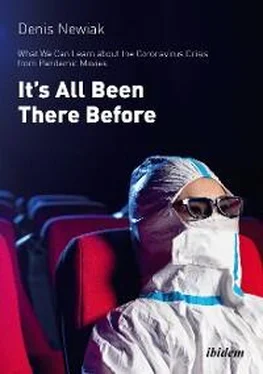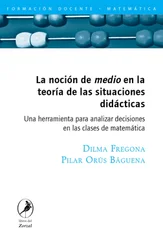ibidem-Press, Stuttgart
Contents
Told you so: A personal foreword
The warnings and advices of the pandemic cinema
Science fiction as a method: Preparing for late modern challenges
Complexity, risk, loneliness: Navigating late modernity using films
Unheard prophets, unheard profiteers: Self-reflective premonitions
Dangerous ignorance, unteachable ignoramuses and crisis-experts
Endangerment, demoralisation and loneliness of helpers and officials
Violence, pogroms, terrorism: Society on the brink of Anarchy
Bioterrorism and failed experiments: Fighting invisible enemies
Hopelessness and fear: Living a life without a future
Suddenly alone: How to survive self-isolation
Urban iconography of the pandemic: Failing cities
Post-modern loneliness and the hope for new communities
Literature
Discussed films
About the Author
This book was first published in German language as Alles schon mal dagewesen. Was wir aus Pandemie-Filmen für die Corona-Krise lernen können (Marburg: Schüren) in June 2020.
Numbers indicate playing time in minutes.
Marginalia summarize the core statement of a paragraph.
Bold marginalia indicate possible concrete options for action within the examined material.
Told you so: A personal foreword
The consequences of the virus pandemic in 2020 have caused great suffering, claimed numerous victims and changed the world forever. There is no doubt that the losses and cuts caused by the Covid-19 disease, which impacts people everywhere, are severe and painful. However, as devastating as the plague may be, it was certainly not surprising – even it is uncommon and uncomfortable to say so. The real surprise about the Corona Crisis was how surprised everyone was, and how decisionmakers and politicians seemed to be overwhelmed by the situation. On the one hand, the history of the 20th century has shown that an increasingly intertwined, mobilized and globalized world has a clear tendency for new types of pathogens to spread rapidly within it – impacting all spheres of social coexistence. Just think of the still ongoing HIV pandemic which is estimated to have killed at least 35 million people. On the other hand, experts from science and research have repeatedly warned that it is only a matter of time before mankind will have to deal with a serious pandemic again.
These warnings, which were primarily addressed to political decisionmakers (who have the means for disaster control and crisis management) unfortunately went largely unheard. There is no other explanation for the serious cuts in everyday social life and, above all, the barely comprehensible economic collateral damage resulting from Covid-19 pandemic management. Yet the costs of adequate crisis prevention would have been only a fraction of what now has to be provided in the form of rescue packages, liquidity assistance and economic stimulus packages. While it would feel more comfortable to blame somebody for the pandemic, it is neither possible nor desirable: even the experts could not foresee the exact form, timing and extent of the pandemic – they only knew that something was coming. “The problem with most people is that they don’t believe something can happen until it already has. It’s not stupidity or weakness. It’s just human nature,” explains a film character in World War Z who had foreseen a zombie pandemic and warned about it relentlessly, while the rest of the audience unanimously hoped it wouldn’t be so bad ( World War Z 53).
As so often in pandemic movies and TV series, one individual in this end-time thriller goes against the prevailing opinion of the many who are unanimous that a global epidemic with fatal consequences is too unlikely to be worth preparing for with the same dedication as against other late modern risks. In recent years, film and television have increasingly taken over this ‘thankless’ role of swimming against the current of appeasement and postponement: anyone (not even talking about those with a weakness for medicine, history or virology) who strays, but who at least occasionally strays into the cinema, zaps through television programs, or sporadically uses new types of streaming services, must sooner or later have come across one of the now countless warning pandemic scenarios that have been created by popular film and television culture. Stories of rapidly spreading diseases have always been an attractive, spectacular topic for dramaturges and directors from film and television (and have therefore always been blessed with high viewer numbers and have always been part of cultural history). However, the abundance of such stories since 2000, with a temporary peak not long before the COVID-19 pandemic, is astonishing. Whether almost documentary dramas such as Contagion , martial blockbusters in the style of Outbreak , more subtle art films à la Blindness , the endless series of zombie films and series such as The Walking Dead – nowadays it is hardly possible to escape the countless virus narratives that have found their way into contemporary culture in the most diverse forms of presentation.
In principle, people consciously seek out cinemas and television couches for relaxation or entertainment and for the sociability associated with it – but at the same time, films and television series take on other functions. The individual viewer does not necessarily have to be aware of these functions, but is nevertheless deliberately exposed to them: film and television allow us to participate in otherwise unknown or inaccessible times, places and milieus, to negotiate individual, interpersonal and social relationships and conflicts, and in this way, they draw attention to new relevant contemporary discourses and the challenges they pose. Films and fictional television speak out about what is currently hanging in the social air without being expressed concretely, thereby making collective hopes and fears speak for themselves before they have even made their way into the general linguistic discourse. In doing so, they transfer confusing contexts into vivid, empathetic, popular art forms. Climate change, for example, is a topic that has been filling scientific congresses and academic publications since the 1970s and is increasingly occupying politicians. However, the slow and not always concretely visible consequences of climate change in everyday perception are harder to grasp – which can partly explain the hesitant intervention (and thus the loss of valuable time) and possibly even the disturbing denials of climate change. It is only with the advent of highprofile cinema productions such as The Day After Tomorrow (USA 2004), documentaries such as An Inconvenient Truth (USA 2006) and the permanent thematization in TV series of all genres that climate change has not only been given a general hearing but has also taken on a visible and thus vivid present form. Only these ‘visual discourses’ generate a direct confrontation, allowing society to debate how to prepare for the future. Cinematic artefacts thereby construct a certain reality and create a general consensus about what is meaningful and what is not, what makes sense and what is true. On the one hand, this strong reality-founding function of all media must always be questioned critically, on the other hand, the social purpose with its incalculable importance for communication and the production of meaning in society as a whole cannot be denied.
However, film and television make complex social megatrends (e.g. the potential consequences of the use of artificial intelligence, widespread power blackouts, and interplanetary colonization as well as very present problems, such as social in-equalities and increasing social isolation) not only perceptible by the senses and thus part of our reality. Filmic forms actively intervene in the lively discourses themselves like hardly any other art or medium. They take a stand for or against certain attitudes, and make proposals for overcoming un-desirable developments. In doing so, film and TV are imagining fantastic, but at the same time very vivid, almost tangible ideas of a desirable counter-world, in whose utopias the errors of the real present have been overcome. Even if these narratives are often imbued with a naïve belief in progress, which must not be accepted without questions, film and television thus not only enable a sensitization to future challenges and a macrosocial discourse on how to deal with them. They also provide a (visual and acoustic) perspective on a desirable vision of a good life, which gives hope for change and thus makes individual commitment to the specific, collectively desirable goal attractive.
Читать дальше












